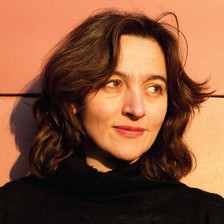
Aleksandra Vrebalov (1970, Serbia/USA) earned her BA degree in composition at the Academy of Arts in Novi Sad in 1992, supervised by M. Štatkić and her MA degree in Belgrade in 1993/94, supervised by Z. Erić and in San Francisco in 1995/96, supervised by E. Armer. She has worked as a teaching assistant at the Academy of Arts in Novi Sad. Today she lives and works in the United States, pursuing an extraordinarily successful career in both composition and teaching. She is also a visiting professor at the Academy of Arts in Novi Sad. Her musical language is based on a postmodernist orientation, with occasional use of models from folk, pop, and rock music and sometimes involves turning toward tonality in clear forms. Especially noteworthy in her oeuvre are Vremena (Times) for orchestra, Gudački kvartet br. 1 and br. 2 (String Quartets Nos. 1 and 2), Elegija za N. N. (An Elegy for an Unknown Person), and Orbite (Orbits) for orchestra, among other works. She has received a number of honours and awards for her work in composition, including two Mokranjac Awards: in 2009, for her piece Stanice (The Stations) for vocal soloists, choir, and orchestra and in 2011, for her opera Mileva, which was premièred as part of the festivities marking the 150th anniversary of the Serbian National Theatre in Novi Sad and then immediately performed at Belgrade’s Sava Centre on 25 October 2011, as part of the BEMUS festival. The opera was then performed in Zagreb (12 December 2012) and at the Armel opera festival in Szeged (12 October 2012). In addition to the Mokranjac Award, this work also won its author the composer of the year title from the Muzika klasika journal (for 2011) and the Jovan Đorđević gold medal of the Serbian National Theatre in Novi Sad (2012).
The opera Mileva has two movements (ten scenes); it was written for a symphonic orchestra, choir, ten soloists, and tape with documentary material (the voice of Albert Einstein and a tamburica [A type of long-necked plucked string instrument (lute) popular in the northern Serbian province of Vojvodina – Translator’s note] orchestra). The complex figure of Mileva Marić is interpreted by two singers: a lyric soprano for young and idealist Mileva and a dramatic soprano for Mileva in later years of her marriage with Einstein, which expresses the differing and often conflicting psychological tendencies in the title role.
The libretto was written by Vida Ognjenović, based on her theatre play about Mileva Marić. The libretto includes excerpts from Shakespeare and Goethe’s poem Urworte. The opera’s languages include Serbian, English (the Shakespeare quotation and Einstein’s own spoken explication of the E = mc2 formula), and German (the quotation from Goethe’s poem and Einstein’s letters to Mileva).
The opera received very good reviews, in the press, on the radio and television alike, as well as in professional journals. These may be illustrated by the following excerpt from the opera’s complex but affirmative reception in the Croatian press:
‘Risking to get stuck in gender stereotypes, we might define Aleksandra Vrebalov and Vida Ognjenović’s Mileva as a “women’s opera”. Such a definition does not simply stem from the gender identity of the authors and the main character. Rather, the entire piece is presented from a female perspective – not only that of Mileva Marić, split in two (and simultaneously interpreted by two singers – “Mileva Jr.” and “Mileva Sr.”), but also that of other female characters – Mileva’s sister Zorka, mother (“Mrs. Marić”), and Mileva’s friends Milana, Ružica, and Helena. Here, the men – including Albert (Einstein) himself – are mostly mere décor, a means in the narration of a primarily female story. The same applies to the choir, which at one point, due to a staging intervention, literally becomes depersonalised. Each of these dramaturgical ideas also found its reflection in Aleksandra Vrebalov’s music. At first sight, it is a typically postmodernist colourfully eclectic score that features quotations from the folklore of Vojvodina hand in hand with Mozart’s Magic Flute and more contemporary musical expression, including occasional use of electronic and concrete music. Still, one should note the way in which the composer used certain elements – in those places where the quotations and paraphrases are recognisable, they serve only as illustrations, whereas their deeper meanings come only upon later reworking, decontextualisation, and deconstruction within a rather uniquely shaped musical expression. After all, music has the last word: in the final duet of “Mileva Sr.” and “Mileva Jr.”, following the final sung words, the singers continue to vocalise in the extensive finale for quite some time, which is, despite the lack of words – or, in fact, precisely because of it – perhaps the most touching moment in the entire opera.’ (Zarez, 20 December 2012).
This is how the jury explained its decision:
‘Aleksandra Vrebalov first wisely chose her subject from the life of Mileva Einstein and then also the postmodernistically conceived direction of its realisation, whereby different arts were made to collaborate in a contemporary and spectacular way. This is a grand opera that communicates with many historical stage forms, ranging from Greek tragedy and its choral prosody, to a heated romanticism and verismo. Under the auspices of her chosen subject and extremely well thought-out concept, Aleksandra Vrebalov’s rather focused creative imagination produced a work of great artistic worth. The opera Mileva belongs among those works that significantly enrich Serbian musical culture.’


